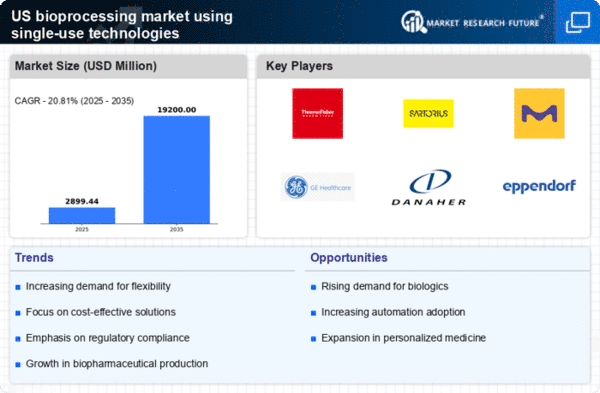Rising Demand for Biopharmaceuticals
The increasing demand for biopharmaceuticals is a primary driver of the single use-bioprocessing market. As the biopharmaceutical sector continues to expand, the need for efficient and flexible manufacturing processes becomes paramount. The market for biopharmaceuticals in the US is projected to reach approximately $300 billion by 2025, indicating a robust growth trajectory. This surge necessitates the adoption of single use technologies, which offer advantages such as reduced contamination risks and lower operational costs. The single use-bioprocessing market is thus positioned to benefit significantly from this trend, as manufacturers seek to streamline production and enhance product quality. Furthermore, the ability to quickly adapt to changing market demands makes single use systems particularly appealing to biopharmaceutical companies aiming to maintain a competitive edge.
Growing Interest in Personalized Medicine
The growing interest in personalized medicine is emerging as a key driver for the single use-bioprocessing market. As the healthcare landscape shifts towards tailored therapies, the demand for flexible and adaptable manufacturing processes increases. Single use systems offer the agility required to produce small batches of customized biopharmaceuticals efficiently. The single use-bioprocessing market is well-positioned to support this trend, as it allows for rapid adjustments in production to meet specific patient needs. With the personalized medicine market projected to reach $2.4 trillion by 2025, the implications for single use technologies are substantial. This growth indicates a potential for increased adoption of single use systems, as manufacturers seek to align their capabilities with the evolving demands of personalized healthcare.
Increased Focus on Quality and Compliance
The emphasis on quality and compliance within the biopharmaceutical industry is a significant driver of the single use-bioprocessing market. Regulatory bodies in the US are increasingly mandating stringent quality standards for biopharmaceutical products, necessitating the adoption of reliable and compliant manufacturing processes. Single use systems are designed to minimize contamination risks, thereby enhancing product safety and quality. The single use-bioprocessing market is adapting to these regulatory requirements by providing solutions that meet or exceed compliance standards. As companies strive to maintain their market position, the integration of single use technologies becomes essential for ensuring adherence to quality regulations. This focus on compliance is likely to propel market growth, as organizations prioritize investments in systems that support regulatory adherence.
Cost Efficiency and Operational Flexibility
Cost efficiency and operational flexibility are pivotal factors driving the single use-bioprocessing market. Single use systems significantly reduce the need for cleaning and validation processes, leading to lower operational costs and shorter production timelines. This is particularly beneficial for small to medium-sized enterprises that may lack the resources for extensive cleaning protocols. The single use-bioprocessing market allows for rapid scale-up and scale-down capabilities, enabling manufacturers to respond swiftly to market fluctuations. As a result, companies can optimize their production strategies without incurring substantial capital expenditures. The potential for cost savings is estimated to be around 30% compared to traditional bioprocessing methods, making single use technologies an attractive option for many organizations in the biopharmaceutical sector.
Technological Advancements in Bioprocessing
Technological advancements play a crucial role in shaping the single use-bioprocessing market. Innovations in materials and design have led to the development of more efficient single use systems, which are increasingly being integrated into bioprocessing workflows. For instance, the introduction of advanced filtration and mixing technologies has improved the performance of single use components, thereby enhancing overall process efficiency. The single use-bioprocessing market is witnessing a shift towards automation and digitalization, which further streamlines operations and reduces human error. As companies invest in these technologies, the market is expected to grow, with estimates suggesting a compound annual growth rate (CAGR) of around 15% over the next few years. This trend indicates a strong inclination towards adopting cutting-edge solutions in bioprocessing.
















